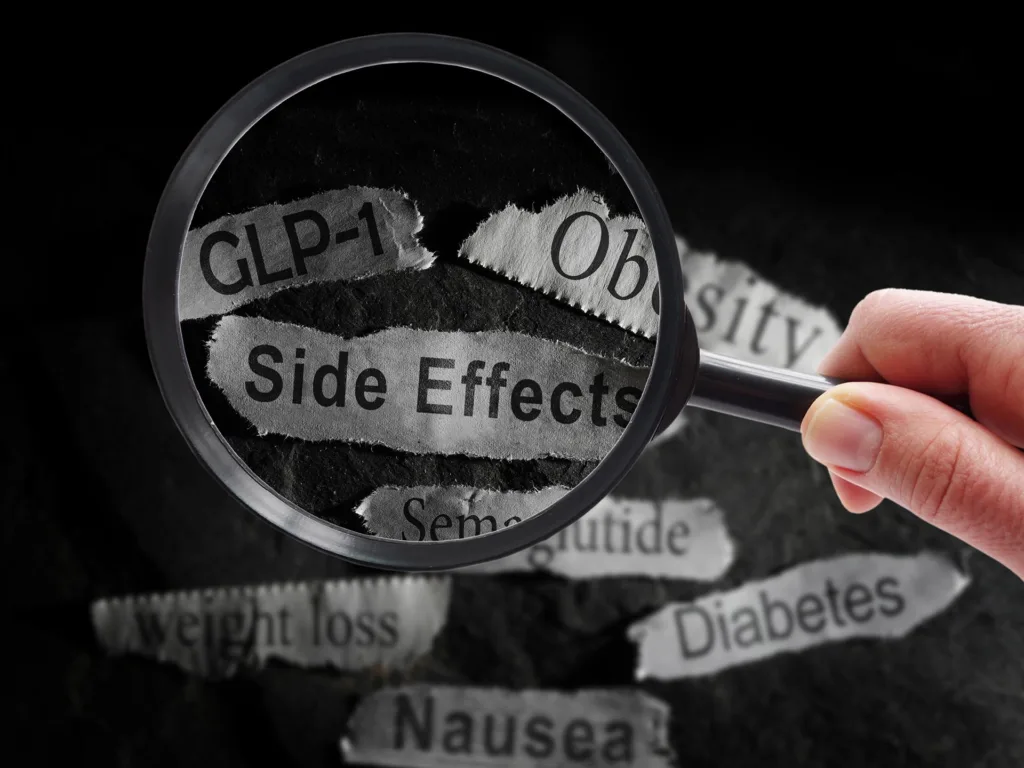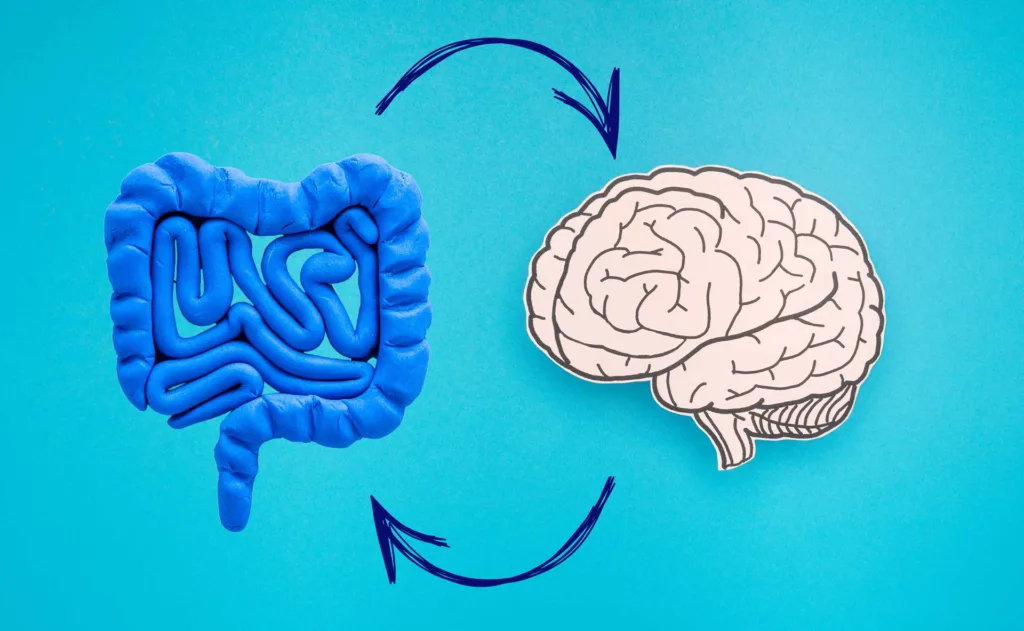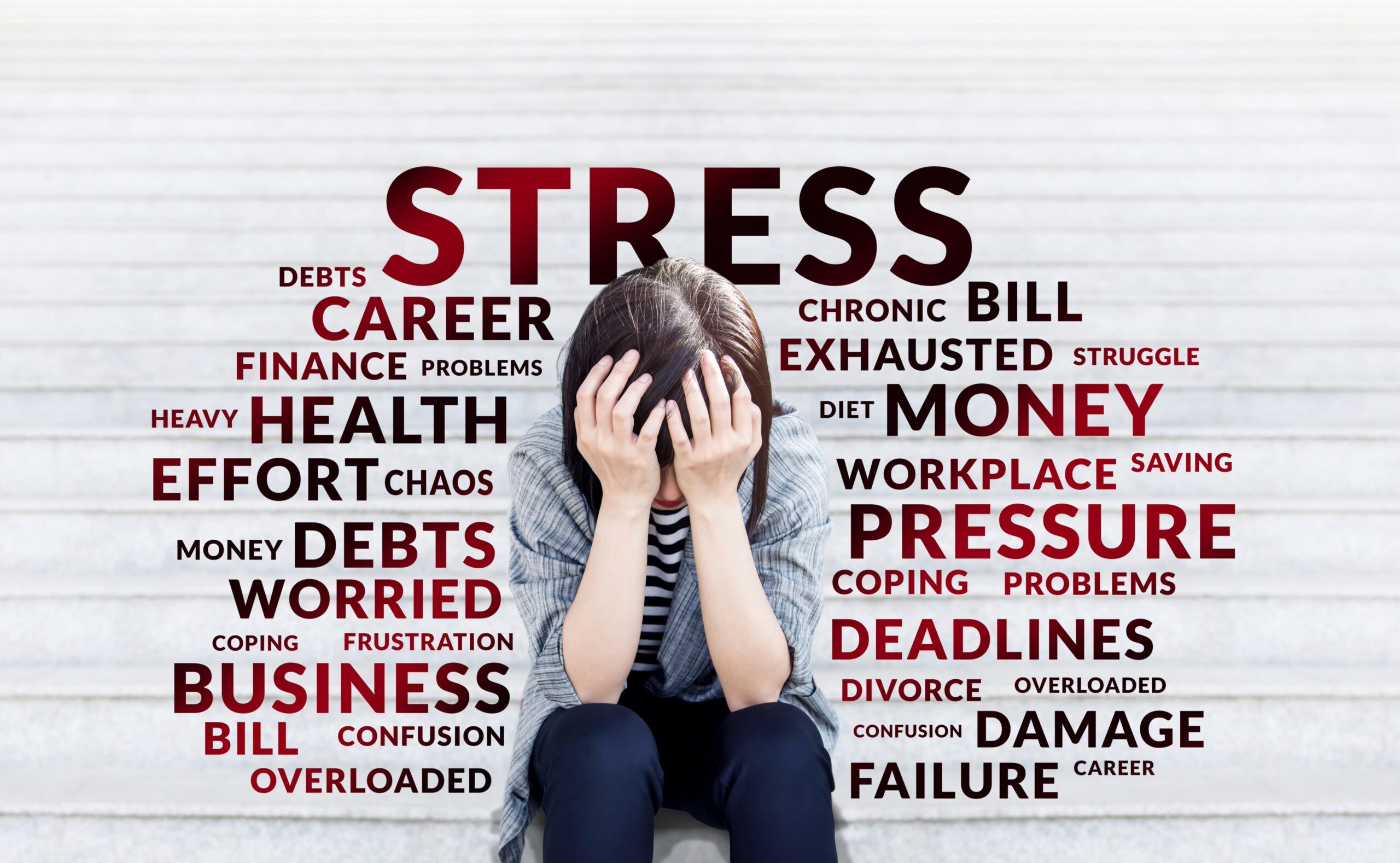I was at a networking lunch where the lady next to me, after hearing that I specialize in IBS and gut health, started talking to me about her experience on using Ozempic. You’ve heard of Ozempic, right? With the help of this drug, she lost 25 kg (55 lbs) in a year, but as a “side effect” her long term digestive issues were greatly improved.
Fascinating! I had heard about this in passing before, so I wanted to take a deeper look into the drug and whether this is a proven effect.

But first, what is Ozempic?
Ozempic is a brand name for the drug semaglutide, a prescription medication to help people with type 2 diabetes to better control their blood sugar levels, and more recently to help people lose weight. Blood sugar becomes lowered through the hormone insulin, which is released into the blood stream in larger amounts, and weight loss is becomes possible through lowered appetite. It’s also likely that eating sugary and fatty foods (and drinking alcohol) becomes less rewarding, leading to weight loss. (2)
Ozempic is a once weekly injection, and it acts as a GLP-1 agonist. This means that the drug mimics the action of the gut hormone GLP-1 (1). And here’s what explains the gut side effects: as a gut hormone it also helps regulate digestion – it decreases stomach movements and secretions, and slows down digestion.
Interestingly, L-cells that secrete GLP-1 in the gut have different functions depending on their location. In the small intestine, GLP-1 is released in response to nutrients (food) in the GI tract, but further down in the large intestine these cells become stimulated by bile acids, fiber, short chain fatty acids and gut microbes. In the same way, GLP-1 seems to slow things down higher in the intestines and speed things up lower down (5), although some studies suggest that also the large intestine becomes slower. GLP-1 has also been found to improve increased permeability in the large intestine, though the study was done in rats (6).

Ozempic digestive side effects
While the lady I talked to mentioned improvements in her gut issues, interestingly the most common side effects are digestive problems: nausea, constipation, diarrhea, abdominal pain and heartburn. (1) Furthermore, even more severe gut problems can be caused by Ozempic and the like - the risk of pancreatitis, stomach paralysis, bile issues and gut obstruction are increased. It’s not clear why this happens, but it probably has something to do with the ability of GLP-1 agonists to slow down the movements of the digestive tract. (3,6)
When it comes to IBS specifically, some evidence shows that GLP-1 levels are lower in people with constipation predominant IBS and these lower levels are connected also with abdominal pain. However, in a study with mice with something like IBS-C, GLP-1 levels where higher than in normal mice. (4)
Importantly, GLP-1 can worsen stress-related changes in intestinal motility and stimulate the HPA-axis (of which the end products are stress hormones). This is bad news, as stress is recognized as a major trigger of IBS. At the same time, GLP-1 may reduce abdominal pain. (4)

What does this all mean?
This all sounds a bit confusing, so what should you think about this all?
GLP-1 is certainly an important gut hormone that all of us have naturally, but medications that mimic this hormone to boost its function are not unproblematic. And while GLP-1 agonists act on the gastrointestinal tract, scientists are only beginning to explore whether they could be utilized as an IBS therapy at some point in the future. If you are someone who is considering, or already on Ozempic or something like it, please keep the severe gut side effects in mind, so that if your gut function changes drastically, or new symptoms arise, you get them checked out immediately.
Since supportive diet and lifestyle changes are necessary (and based on what the lady told me, often forgotten) even when on this medication, this is a factor to consider and maximize first. If you are not sure what this means, you can write to me.
Also, you can begin supporting your GLP-1 levels naturally by choosing foods that stimulate GLP-1 secretion, like eggs, avocado, olive oil, nuts, and high fiber foods (whole grains, vegetables) (7-12). There’s also some evidence that certain probiotics can enhance GLP-1 secretion, for example Akkermansia municiphila (12).

Get your doc to give you the full story
Many medications have side effects that affect the digestive system. Whether GLP-1 agonists are helpful or harmful depends on the individual. Importantly, talk with your doctor about the GI side effects to make sure the drug is suitable for you. If you are feeling confused, or unsure, ask follow up questions. In fact, any time you are at the doctor’s office and have questions, voice them out! Too often I hear people being disappointed with their doctors leaving them confused about what they should do, especially when it comes to IBS, so demand more detailed explanations. This is your health that we are talking about at the end of the day and it’s the doctors job to explain to you properly.
Thank you so much for reading about this timely topic! Be in touch if you have questions, or if you’d like a topic to be discussed here ([email protected]).

Love,
Anna-Kaisa
PS. Did you download my free ebook yet? Get it here.
PPS. Learn to Meditate –course 2.0 is starting in 3 weeks! If you want a method that gets better at mending your gut-brain axis with time (the root cause of IBS), this course is excellent for you. Sign up here - only $105!
References:
- Puckey, M. Ozempic. Drugs.com. 2025. https://www.drugs.com/ozempic.html accessed 3/6/2025
- Smith NK, Hackett TA, Galli A, Flynn CR. GLP-1: Molecular mechanisms and outcomes of a complex signaling system. Neurochem Int. 2019 Sep;128:94-105. doi: 10.1016/j.neuint.2019.04.010. Epub 2019 Apr 17. PMID: 31002893; PMCID: PMC7081944.
- Dewan, P. Weight Loss Drugs Ozempic and Wegovy Linked to Severe Gut Problems: Study Newsweek. https://www.newsweek.com/weight-loss-drugs-ozempic-wegovy-gut-problems-health-1832375 accessed 3/19/2025
- O'Malley D. Endocrine regulation of gut function - a role for glucagon-like peptide-1 in the pathophysiology of irritable bowel syndrome. Exp Physiol. 2019 Jan;104(1):3-10. doi: 10.1113/EP087443. Epub 2018 Dec 10. PMID: 30444291.
- Funayama T, Nozu T, Ishioh M, Igarashi S, Sumi C, Saito T, Toki Y, Hatayama M, Yamamoto M, Shindo M, Tanabe H, Okumura T. Centrally administered GLP-1 analogue improves intestinal barrier function through the brain orexin and the vagal pathway in rats. Brain Res. 2023 Jun 15;1809:148371. doi: 10.1016/j.brainres.2023.148371. Epub 2023 Apr 17. PMID: 37076092.
- Holst, J. J., Andersen, D. B., & Grunddal, K. V. (2021). Actions of glucagon‐like peptide‐1 receptor ligands in the gut. British Journal of Pharmacology, 179(4), 727-742. https://doi.org/10.1111/bph.15611
- Santos-Hernández M, Amigo L, Recio I. Induction of CCK and GLP-1 release in enteroendocrine cells by egg white peptides generated during gastrointestinal digestion. Food Chem. 2020 May 30;329:127188. doi: 10.1016/j.foodchem.2020.127188. Epub ahead of print. PMID: 32516710.
- Bodnaruc AM, Prud'homme D, Blanchet R, Giroux I. Nutritional modulation of endogenous glucagon-like peptide-1 secretion: a review. Nutr Metab (Lond). 2016 Dec 9;13:92. doi: 10.1186/s12986-016-0153-3. PMID: 27990172; PMCID: PMC5148911.
- Zhu L, Huang Y, Edirisinghe I, Park E, Burton-Freeman B. Using the Avocado to Test the Satiety Effects of a Fat-Fiber Combination in Place of Carbohydrate Energy in a Breakfast Meal in Overweight and Obese Men and Women: A Randomized Clinical Trial. Nutrients. 2019 Apr 26;11(5):952. doi: 10.3390/nu11050952. PMID: 31035472; PMCID: PMC6567160.
- Hira T, Trakooncharoenvit A, Taguchi H, Hara H. Improvement of Glucose Tolerance by Food Factors Having Glucagon-Like Peptide-1 Releasing Activity. Int J Mol Sci. 2021 Jun 21;22(12):6623. doi: 10.3390/ijms22126623. PMID: 34205659; PMCID: PMC8235588.
- Indarto D, Rochmah DN, Wiboworini B, Pratama YM, Wibowo YC. Effects of Vegetables Consumption Before Carbohydrates on Blood Glucose and GLP-1 Levels Among Diabetic Patients in Indonesia. Int J Prev Med. 2022 Nov 23;13:144. doi: 10.4103/ijpvm.IJPVM_704_20. PMID: 36618536; PMCID: PMC9811965.
- Cani PD, Knauf C. A newly identified protein from Akkermansia muciniphila stimulates GLP-1 secretion. Cell Metab. 2021 Jun 1;33(6):1073-1075. doi: 10.1016/j.cmet.2021.05.004. PMID: 34077715.
To truly manage IBS, you need to fix the way your brain and your gut talk to each other.
When talking about irritable bowel syndrome and IBS symptoms (abdominal pain, bloating, diarrhea, constipation), the discussion is not complete without considering the gut-brain axis. Especially since IBS experts are now calling the syndrome a disorder of gut-brain interaction. It’s a fascinating subject that reminds you how everything in the body affects everything - in good and in bad. This applies also to managing IBS symptoms: it’s not enough to focus on one aspect of gut health, like your diet, but also sleep, circadian rhythms, exercise, stress, and even thoughts have to be assessed as all of these affect the gut-brain axis.

What is the gut-brain axis
Often called the gut-brain-microbiota axis, the gut-brain axis is the communication channel between the gut and the brain, the two-directional phone line between the two.
Your gut and your brain are talking to each other all the time! The main office (the brain) wants to know what the branch office is doing (the gut) and give orders if need be. They relay information back and forth about gut processes, hunger, satiety, stress, and feelings, just to name a few.
Problems in this information exchange are linked to irritable bowel syndrome and other “functional” gut problems, immune function, sleep problems, mood disorders, neurodegenerative diseases, and even obesity.
How are your gut and your brain connected?
It’s not simple. Many processes are involved:
- Central nervous system (brain and spinal cord): both the sympathetic (stress response) and the parasympathetic (rest response) branches of the autonomic nervous system are involved, especially the vagus nerve
- Enteric nervous system (gut’s own nervous system)
- Endocrine pathways (hormones): such as HPA-axis with cortisol (stress hormone), gut hormones like ghrelin (hunger hormone) and leptin (regulates appetite)
- Immune system of the gut: cytokines (inflammation controlling molecules)
- Microbiota (gut microbes) and the molecules they produce, like short chain fatty acids and neurotransmitters

To simplify, what you need to know is that
- The enteric nervous system takes care of digestion, but the brain can override its functioning in stressful situations.
- The vagus nerve is the main information pathway between the brain and the gut, and there is evidence to show that it’s not working well in people with IBS.
- Gut microbes are highly important, and how you take care of them makes an impact on the gut-brain axis level also.
What disrupts the gut-brain axis
It’s not completely clear how this happens, but it seems stress plays a big role, as does the health of the gut microbiota. Your gut microbes are affected by your lifestyle and your diet, both in helpful and harmful ways. It is thought that dysbiosis of the gut microbiota (negative changes in your gut microbes) can cause problems in the gut-brain axis, but it is not clear whether dysbiosis happens first, or whether the disruption of the gut-brain axis causes the dysbiosis.
IBS can become triggered by a gut infection, which could support the idea that your gut microbe balance becomes disrupted first, but an infection also causes inflammation which the immune system controls. Gut infection is also a source of stress, and a sensitive brain may overreact to infection signals coming from the gut, starting a feedback loop that causes IBS. So, it’s not clear.
The brain then is responsible for assessing whether we are in danger or not, but your lifestyle and your diet can also affect your stress sensitivity, or how readily a stress response is triggered in the body. A typical Western diet and an irregular lifestyle with sleep deprivation could make you more sensitive to stress.

Stress sensitivity
People who have had lots of stress in their lives, whether in childhood or in adulthood, become more sensitive to stress, and are at a higher risk for developing IBS. Studies show that over time their brains have adapted to stress in an unhelpful way, which explains this increased sensitivity, and probably also why not everyone with stress has IBS.
Additionally, people with IBS tend to have these similar structural brain changes and increased stress sensitivity also, and a history of highly stressful life periods. For example, I had a client whose gut symptoms began after a serious natural disaster hit her country. This all suggests that chronic stress wreaks havoc on the gut-brain axis and promotes chronic gut issues, like IBS.
What’s more, it’s relatively common that anxiety and depression happen together with IBS, both probably feeding the other. What came first, however, is not clear.
Looking after the gut-brain axis
Everyone can benefit from taking good care of the gut-brain axis, but this is especially important for people with IBS and other functional digestive disorders. It seems that gut symptoms are like the tip of an iceberg – your gut-brain axis may have been disrupted for a while before gut symptoms surface!
How to nurture your gut-brain axis:
- Feed your good gut bacteria with a balanced diet rich in fiber
- Support digestive processes by eating regularly, avoiding overeating, drinking enough fluids, limiting alcohol consumption
- Stimulate vagus nerve and calm the nervous system with stress releasing activities
- Activate brain areas that lower stress sensitivity: breathing exercises, meditation
- Work on your mindset to reduce catastrophizing, expecting problems etc.
- Pay less attention to your gut symptoms
- Nurture body’s processes: keep regular daily rhythms with sleep, meal patterns and exercise, do your best to sleep well
- Perhaps specific supplements, like probiotics can help
It’s a lot! But not impossible to do.

Strong gut-brain axis plan
The first step is to map out honestly how you are doing in these different areas listed above.
The second step is to make a plan: what needs to change and in what order. Consider what might be easier to start with, or what might make the biggest impact.
But you don’t have to figure this out on your own. Nurturing a sturdy gut-brain axis and relieving IBS symptoms in the process is what I do. If you are not sure, let’s chat. You will have the opportunity to tell an expert about your situation, and I will go over your best next steps without you having to commit to a program. I want to make sure you and I are a good match before you invest anything in working together. Book you free consultation here.
I hope you enjoyed learning about the all-important gut-brain axis! If you are feeling overwhelmed by this, just remember that even small adjustments to diet, lifestyle, thought patterns and stress sensitivity can make a big difference. Check out all of my free resources (scroll down my home page) - they provide lots of tips to get going with.
Thank you for reading!
Love,
Anna-Kaisa

PS: Book your free 30-minute consultation here!
PPS: Feeling bloated? Get your copy of the free “5 Easy Ways to Beat the Bloat” guide here!
References
- Chen M, Ruan G, Chen L, Ying S, Li G, Xu F, Xiao Z, Tian Y, Lv L, Ping Y, Cheng Y, Wei Y. Neurotransmitter and Intestinal Interactions: Focus on the Microbiota-Gut-Brain Axis in Irritable Bowel Syndrome. Front Endocrinol (Lausanne). 2022 Feb 16;13:817100. doi: 10.3389/fendo.2022.817100. PMID: 35250873; PMCID: PMC8888441.
- Mayer EA, Nance K, Chen S. The Gut-Brain Axis. Annu Rev Med. 2022 Jan 27;73:439-453. doi: 10.1146/annurev-med-042320-014032. Epub 2021 Oct 20. PMID: 34669431.
- Mayer EA, Labus JS, Tillisch K, Cole SW, Baldi P. Towards a systems view of IBS. Nat Rev Gastroenterol Hepatol. 2015 Oct;12(10):592-605. doi: 10.1038/nrgastro.2015.121. Epub 2015 Aug 25. PMID: 26303675; PMCID: PMC5001844.
- Karakan T, Ozkul C, Küpeli Akkol E, Bilici S, Sobarzo-Sánchez E, Capasso R. Gut-Brain-Microbiota Axis: Antibiotics and Functional Gastrointestinal Disorders. Nutrients. 2021 Jan 27;13(2):389. doi: 10.3390/nu13020389. PMID: 33513791; PMCID: PMC7910879.
- Sun LJ, Li JN, Nie YZ. Gut hormones in microbiota-gut-brain cross-talk. Chin Med J (Engl). 2020 Apr 5;133(7):826-833. doi: 10.1097/CM9.0000000000000706. PMID: 32132364; PMCID: PMC7147657.
If you are wondering the answer to this question, you are not alone. There are millions of people out there experiencing gut symptoms and wondering if they should be worried about them.
The most common IBS symptoms are:
- Abdominal pain
- Bloating and/or distention of the belly
- Constipation
- Diarrhea
The way IBS is diagnosed, in order for your symptoms to “qualify” as IBS, abdominal pain must be present. It can be crampy, aching, and even quite severe. Often it is triggered or made worse by food, bowel movements and stress.

This abdominal pain is also often associated with a change in stool frequency or consistency. It typically gets better after having a bowel movement, and it would actually be concerning if it didn’t. Since abdominal pain in IBS is considered visceral pain, you’ll often feel pain in the midline of the body.
Bloating is a feeling of tightness and fullness of the abdomen, and your belly feels like it is visibly bigger, even though it may or may not be so. Distention is the term for your belly protruding more than usual with measurable increase in the abdominal circumference. People feel like they have a balloon in their belly, or that they are pregnant when they are not pregnant. Bloating and distention can cause discomfort and it may feel embarrassing.
Constipation is an infrequent bowel movement pattern, in which you have a bowel movement less than three times a week. Though it seems to me you can feel constipated even if you move your bowels daily. Constipation usually goes hand in hand with small, hard, pebble-like stools and they are hard to pass. You might feel like your bowels are not emptying fully.
Diarrhea is the opposite of constipation. It refers to loose, watery stools, more than three times per day. Diarrhea could also cause urgency - you can’t wait a minute longer to go to the bathroom or else an accident might happen.

These symptoms can be very debilitating. They might also change from day to day, one day having constipation and the next diarrhea. People experiencing IBS symptoms may feel like they need to watch closely what they eat, not stray too far from the toilet, and avoid going out to see friends, travel or eat out.
If you’ve been experiencing IBS symptoms for longer than a few weeks, or less if the symptoms are very difficult, I encourage you to go get them checked out. Then, even if your symptoms didn’t fulfill the IBS diagnostic criteria, you’d find out whether there’s something more serious going on, or whether there’s nothing to worry about. Either way, it’s better to be in the know than to be guessing!
If you have been diagnosed with IBS, but are not sure whether this is the right diagnosis, I would again encourage you to speak with your doctor. Ask how they diagnosed the disorder and voice your concerns. The end result (should be) that your doctor will either order more tests, or explain to you more thoroughly their thinking process, so that you can rest assured the right call has been made and that you can begin to apply the right therapies.
If you end up being diagnosed with IBS, or even if you’re not, I have what you need to improve your symptoms. Sign up to my IBSwise program, or if you’d like a more individualized approach, book a free 30-minute chat to discuss your next move.
Whatever you do, don’t be left alone with your symptoms! There is so much you can do to ease them.
Love,
Anna-Kaisa

